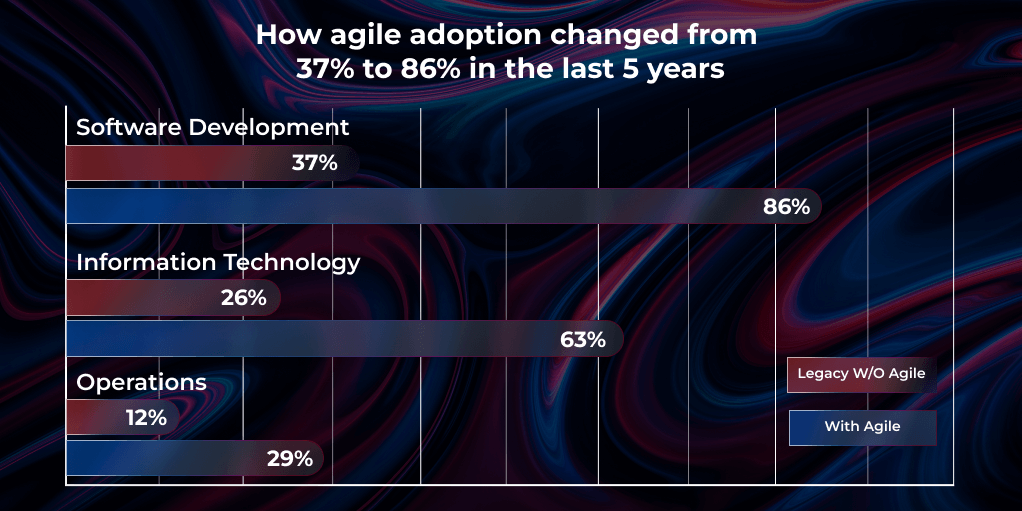The software development landscape is evolving rapidly, demanding unprecedented agility and adaptability. Outsourcing has become a strategic choice for businesses seeking to leverage external expertise and resources to drive innovation. In this context, Agile methodology emerges as a powerful framework for managing outsourced software projects.
Agile, with its emphasis on iterative development, customer collaboration, and flexibility, perfectly aligns with the dynamic nature of outsourcing. By embracing Agile, businesses can unlock a world of benefits, including faster time-to-market, improved quality, and enhanced collaboration.
Intelegain, a leading provider of software development services, is committed to delivering exceptional Agile solutions. Our expertise and experience enable us to partner with clients in transforming their software development processes and achieving their business objectives.
In this blog, we will explore the compelling reasons to choose Agile for your outsourced software projects and how Intelegain can be your trusted partner in this journey.
Adaptability of Agile Model
Agile has rapidly gained traction as the preferred methodology for software development projects due to its inherent flexibility and responsiveness to change. Numerous studies and reports underscore its growing dominance.
Emphasis on speed, innovation, and customer focus aligns closely with Agile principles.
– Jeff Bezos | Amazon
Why Choose Agile over other models
Agile methodology offers a refreshing approach to software development that prioritizes adaptability, collaboration, and delivering value early and often. Its core principles resonate strongly with the challenges and opportunities presented by outsourced projects.
Key reasons to choose Agile
Flexibility: Agile’s iterative nature allows for seamless adjustments to evolving requirements and market conditions, a common occurrence in outsourced projects.
Collaboration: Agile fosters strong partnerships between development teams and clients, essential for successful outsourcing relationships.
Customer Focus: By prioritizing customer satisfaction, Agile ensures that the product aligns with user needs and expectations.
Rapid Delivery: Agile’s emphasis on delivering working software in short iterations accelerates time-to-market, a critical factor in today’s competitive landscape.
Facebook’s rapid growth and ability to adapt to changing trends are often attributed to Agile-like practices.
– Mark Zuckerberg | Meta
Benefits of Agile for Outsourced Software Projects
Agile methodology offers a plethora of advantages when applied to outsourced software projects. By embracing Agile principles, organizations can significantly enhance project outcomes, improve collaboration, and reduce risks.
Improved Communication and Collaboration
- Enhanced transparency: Agile’s emphasis on frequent communication and collaboration fosters transparency between the client and the outsourcing team. Regular interactions, such as daily stand-ups and sprint reviews, ensure everyone is aligned on project goals and progress.
- Stronger relationships: Agile promotes a collaborative culture, building trust and rapport between the client and the outsourcing partner. This leads to better problem-solving and decision-making.
- Reduced misunderstandings: Frequent interactions minimize the risk of misunderstandings and misinterpretations, leading to higher quality deliverables.
Faster Time-to-Market
- Iterative development: Agile’s iterative approach allows for rapid development and delivery of valuable features. This accelerates time-to-market and enables businesses to gain a competitive edge.
- Reduced time-to-value: By focusing on delivering high-value features first, Agile helps organizations realize business benefits sooner.
- Increased responsiveness: Agile teams can quickly adapt to changing market conditions and customer needs, ensuring the product remains relevant.
Increased Flexibility and Adaptability
- Ability to change direction: Agile’s iterative nature allows for course corrections based on new information or changing priorities. This flexibility is crucial in the dynamic world of software development.
- Risk mitigation: Agile’s incremental approach helps identify and address risks early in the project lifecycle, reducing the impact of unforeseen challenges.
- Improved project outcomes: By adapting to changing requirements, Agile projects are more likely to deliver successful outcomes that meet customer expectations.
Enhanced Project Visibility and Control
- Regular status updates: Agile provides frequent visibility into project progress through sprint reviews and demonstrations. This empowers stakeholders to make informed decisions.
- Improved risk management: Agile’s emphasis on continuous monitoring and adaptation helps identify and mitigate risks proactively.
- Increased stakeholder satisfaction: By keeping stakeholders informed and involved, Agile enhances overall project satisfaction.
Higher Quality Deliverables
- Continuous improvement: Agile promotes a culture of continuous improvement, leading to higher quality software.
- Reduced defects: Agile’s focus on testing and quality assurance helps identify and fix defects early in the development process.
- Increased customer satisfaction: By delivering high-quality products that meet customer needs, Agile enhances overall satisfaction.
Reduced Risks
- Early identification of issues: Agile’s iterative approach allows for early detection and resolution of problems.
- Mitigated financial risks: By breaking down the project into smaller increments, Agile reduces the financial risk of project failure.
- Improved project success rate: Agile’s focus on flexibility and adaptability increases the likelihood of project success.
By leveraging these benefits, organizations can significantly improve the outcomes of their outsourced software projects and achieve their business objectives.
Agile vs. Traditional Methodologies
To fully appreciate the advantages of Agile for outsourced software projects, it’s essential to contrast it with traditional methodologies, primarily the Waterfall model.
Waterfall Methodology
Sequential approach: The Waterfall model follows a linear, sequential process with distinct phases (requirements, design, development, testing, deployment).
Rigid structure: Once a phase is completed, it’s difficult to go back and make changes.
Extensive upfront planning: Requires detailed documentation and planning before development begins.
Less customer involvement: Customer interaction is limited to the requirements gathering phase.
| Feature | Agile | Waterfall |
|---|---|---|
| Approach | Iterative and incremental | Sequential and linear |
| Planning | Flexible, with ongoing planning | Detailed upfront planning |
| Customer involvement | High, continuous collaboration | Limited, primarily in the beginning |
| Adaptability | Embraces change | Resistant to change |
| Deliverables | Frequent working software | Final product at the end |
| Risk management | Continuous risk assessment | Risk assessment primarily upfront |
Why Agile is Better Suited for Outsourcing
Agile’s flexibility, customer focus, and iterative nature make it an ideal choice for outsourced software projects. In contrast, the rigid structure of Waterfall can hinder collaboration, increase risks, and delay project delivery in an outsourcing environment.
By understanding these key differences, businesses can make informed decisions about the best approach for their outsourced software development initiatives.
Agile methodology has emerged as the preferred approach for managing outsourced software projects due to its inherent flexibility, customer focus, and ability to deliver value rapidly. By embracing Agile principles, organizations can significantly enhance project outcomes, improve collaboration, and reduce risks.
Intelegain, as an agile software development company, with its deep expertise in Agile outsourcing, is committed to partnering with clients to unlock the full potential of this transformative methodology. Our focus on building high-performing teams, fostering effective communication, and addressing challenges ensures successful project delivery.
Why Choose Agile over other models
Agile methodology offers a refreshing approach to software development that prioritizes adaptability, collaboration, and delivering value early and often. Its core principles resonate strongly with the challenges and opportunities presented by outsourced projects. For projects with evolving requirements, an agile software development company offers the adaptability needed for success.











